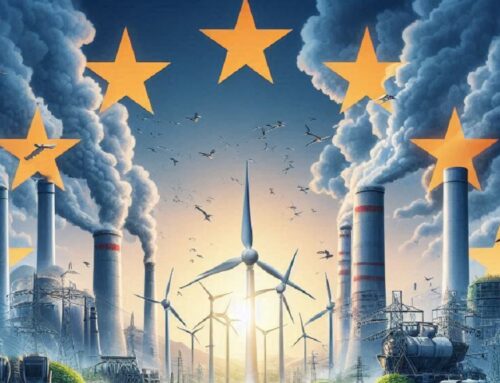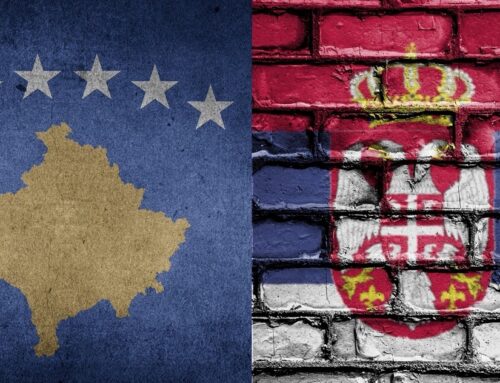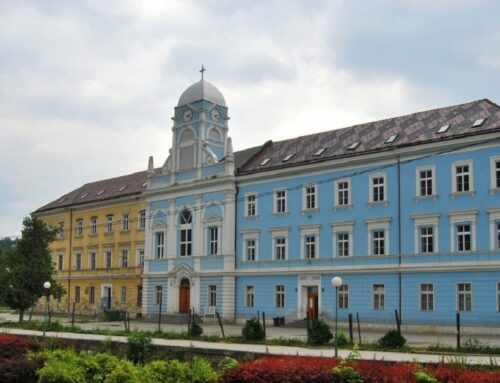Western Balkans has historically been a sphere of Russian specific interest. During the 18th, 19th and early 20th century the region has been a place of clash of interest of such major powers as Austria, Ottoman empire and Russian empire. In this context Russia posed itself as a protector of local population basing this on close religious ties (as large share of local population are orthodox Christians) as well as pan-Slavic ideas. In the soviet period ties remained active, even though in the second half of 20th century they were hampered by the political course of Broz Tito. In this article we examine relations between Russian and Western Balkans after the collapse of the soviet bloc with the main focus on Russian policy after Kosovo conflict.
Picture 1: Western Balkans geography

In the 1990s Western Balkans once again became the place of most intense conflicts in Europe – same as in the beginning of the century. Ethnic, religious and cultural diversity of the population of Yugoslavia together with inaccurate policies of central government led to the outbreak of violent conflicts that eventually led to the collapse of the country. In the complicated framework of ethnic clashes Russia consistently supported Serbs as they were orthodox Christians and had a tradition of warm perceptions of Russia. This resulted in that that Russia supported Yugoslavian government during 1990s. For Euroatlantic community, Western Balkan conflicts not only were a major point of concern, but also presented an opportunity to set the standard of conflict resolution in post-bipolar world. At the same time, Russia perceived itself as one of major brokers of the peacekeeping process, at the same time evidently supporting one of the parties to the conflict. The absence of opportunity to undertake peacekeeping actions basing of consensus between the West and Russia led to that Western countries preferred to use NATO framework instead of the UN framework for conflict solving, which became a key point of Russian criticism. Even though Russia participated in peacekeeping missions in Bosnia and Herzegovina (SFOR) and Kosovo (KFOR) until 2003, it strongly condemned NATO bombings of Yugoslavia in 1999.
When Putin came to power, Russia continued its opposition to Western format of conflict solving. Apart from withdrawal from peacekeeping missions in 2003, it opposed international war crimes tribunals for Serbian leaders and blocked recognition of Kosovo by the UN in 2008[1]. In 2000s, being unable to constructively oppose Western conflict-solving policy on the military level, Russia prioritized expanding its economic presence in the region. This was possible due to a number of regional economic problems that discouraged Western investors: outdated socialist infrastructure, poor governance, continuing regional conflicts and 2008 crisis. Among most significant Russian economic steps, one should mention:
- acquisition of 79,5% share of Serbian Beopetrol by Russian LUKoil in 2003[2],
- acquisition of oil refinery and lubricant producer Modrice in Bosnia and Herzegovina by Zarubezhneft
- acquisition of aluminium plant in Montenegro by Russian En+ Group in 2005[3] (through Salomon Enterprises Limited)
- acquisition of majority share in Naftna Industrija Srbije by Gazprom in 2008[4]
We can easily notice that most major acquisitions were performed by Russian economic actors in energy sector. This reflects a typical for Russia disproportional capacity to gain dominance in energy markets with the lack of capacity to become influential in other realms. It is also important to mention that not always such major acquisitions were profitable for Russian companies- Zarubezhneft’s financial losses in Bosnia and Herzegovina can serve as an example[5]. Despite of this, Russian companies in such cases show no intention to leave the market, which proves that these economic operations have mostly political meaning for Russia.
In 2010s Russia started to diversify its tools of gaining regional influence. Apart from economic tools, it tried to increase its military presence in the region, which reflects growing Russian ambitions after 2000s recovery. 2012 saw the establishment of Russian-Serbian Humanitarian center in Niš according to an agreement between Serbian government and Russian Ministry of Exceptional Situations. Due to the fact that Russia later requested diplomatic status for its staff in Niš, suspicions appeared about that Russian staff may be performing actions connected with security and intelligence gathering on the base. Apart from that, Russian and Belarus donated military equipment to Belgrade[6], while Serbia participated in Slavic Brotherhood military exercises with Russia and Belarus[7]. Finally, in 2013 Russian reportedly made an attempt to negotiate with Montenegro its regular access to the seaports of Bar and Kotor for its battleships[8].
Another track of Russian regional policies were conflict-enhancing efforts. This controversial political dimension was caused by the growing eurointegration of Western Balkans countries. As the overall trend on westernization of the region was becoming increasingly evident with time, Russia started to undertake measures that could slow the process. In 2014 Russia abstained from extending EUFOR in Bosnia and Herzegovina[9]. In 2016 a coup was exposed in Montenegro that was planned by Russian and Serbian nationals[10]. In 2016-2017 Montenegro was a target of numerous Russian cyber-attacks. In 2018 Russia was blamed for sponsoring protests in North Macedonia caused by the agreement with Greece about the name of the state[11]. Alongside with cooperation with local right-oriented politics Russia has also made efforts to enter regional informational space: in 2014 Sputnik News began broadcasting in Serbian.
By 2022, Russian policies in Western Balkans has reached mixed results. During the 2000s and 2010s close relations between Serbia and Russia symbolized remaining influence of the latter in the region. This was especially evident in the context of Western sanctions against Russia in 2014, since Serbia did not join them. 2017 visit of Serbia’s president Aleksandar Vučić to Russia[12] and Russian help with vaccines during COVID-19 pandemic[13] showed that the countries consider each other to be allies. However, apart from Serbia Russia struggled to retain allies in the region. On top of that, even Serbia with time has started to show signs of cautious approach towards Russia, trying to limit its military influence. In 2018 Serbian police closed down a ‘patriotic youth camp’ organized by the Russian nationalist group E.N.O.T Corp, whose members had fought in Donbas. In 2019 Serbian security services revealed activities of Russian intelligence operatives who were passing money to Serbian army officials[14]. Finally, Serbia has intense cooperation with NATO: in 2016 the Serbian parliament ratified an agreement that provided NATO with the right to freely move stuff across Serbian territory and also granted it diplomatic immunity, while Russian-Serbian Humanitarian Center in Niš failed to receive this status[15]. The reason for such controversial policy consists in two main factors.
Firstly, as was mentioned above, Russia has been unable to remain a key trade partner for the region, even though it had significant presence in energy sector. By 2021 Russia made up only 3,9% of regional import and 2,7% of regional export. At the same time, the EU is by far largest trading partner of the region, which determines the westernization of its foreign policy interests.
Picture 2: Trade partners of Western Balkans in 2021[16]

On top of that, in energy sector Russian positions are not that strong and tend to weaken with time. Even though in Serbia, North Macedonia and Bosnia and Herzegovina almost 100% of export comes from Russia – Kosovo, Montenegro and Albania almost do not depend on Russian energy sources. Besides, recent energy projects such as Trans-Adriatic Pipeline (TAP) (commissioned in 2020) and proposed Ionian-Adriatic Pipeline (IAP) enable region to substantially diversify its energy import. These projects are parts of a larger Southern Gas Corridor, an initiative of the European Commission aimed at reducing European dependence on Russian energy import.
Picture 3: Trans-Adriatic Pipeline (TAP) and Ionian-Adriatic Pipeline (IAP)

Picture 4: Southern Gas Corridor

Secondly, since 2014 the relations between Europe and Russia has been increasingly deteriorating, therefore it has become much more difficult to remain a Russian ally and pursue practical foreign policy interests on the West at the same time. Since benefits from being an ally of Russia are very limited, while cooperation with the EU is inevitable from the practical point of view, even Serbia undertakes measures to re-position itself in the international arena.
In 2022 political conflicts in Western Balkans intensified. Disputes between Kosovo and Serbia about Kosovar authorities using white stickers to hide state symbols on vehicles coming from Serbia and later protests of Serbian minorities in North Kosovo caused by the arrest of a former Serbian policeman has caused an unprecedented level of tensions. Serbian citizen blocked main roads and Serbia asked for a permission to deploy its forces in the region for the stabilization of situation. It is worth mentioning that generally Russia benefits from the conflict, since it distracts the attention of the EU from the Ukrainian war, therefore the conflict can be considered to be a sign of partial success of Russia building alliance with Serbia. At the same time, the Ukrainian war has caused major shifts in Serbian foreign policy: Serbia supported the UN General Assembly resolution condemning Russia’s invasion of Ukraine and also voted in favor of expelling Russia from the UN Human Rights Council[17]. Serbia is evidently looking for retaining close relations with Russia as much as possible, however growing international isolation of Russia makes it increasingly difficult.
Another major shift can be observed in energy system. Even though in May 2022 Serbia secured a three-year contract for deeply discounted Russian gas, later sanctions imposed on Russia by the EU disabled Serbia from the opportunity to receive it. As a result, Serbia’s government reached an agreement about electricity import from Azerbaijan, as well as import of non-Russian oil through Croatia through Jadranski Naftovod (JANAF)[18]. Serbian President, Aleksandar Vučić, has also recently claimed that his country would align its position towards Russia with the position of the EU[19].
Picture 5: Jadranski Naftovod (JANAF)

In conclusion, we believe that relations of Russia with Western Balkans has followed a complicated track. Russia has retained strategic partnership with Serbia and has managed to build some presence in regional energy sector. At the same time, the region in general has been moving westwards and Russian attempts to destabilize it and slow European integration has not managed to produce effect that could reverse the process. We believe that the absence of economic potential was the main reason for inefficiency of Russian policy in the region. On top of that, Russian policy towards Ukraine narrowed opportunities for traditional allies such as Serbia to retain good relations with both Russia and the EU and given the economic importance of the latter predetermined further decline of Russian influence in the region.
References:
[1] Louis Charbonneau. An independent Kosovo can never join U.N.: Russia. URL: https://www.reuters.com/article/us-serbia-kosovo-un-idUSN165309320080117
[2] LUKOIL in the Republic of Serbia- Lukoil official website. URL: https://www.lukoil.com/Company/BusinessOperation/GeographicReach/Europe/LUKOILinSerbia
[3] European Parliament Backs En+ Group’s Ownership in Montenegro Aluminium Smelter- aluminiuminsider.com URL: https://aluminiuminsider.com/european-parliament-backs-en-groups-ownership-in-montenegro-aluminium-smelter/
[4] Uchenna Izundu. Gazprom Neft finalizes 51% stake in Serbia’s NIS.- Oil&Gas Journal. URL: https://www.ogj.com/general-interest/article/17278484/gazprom-neft-finalizes-51-stake-in-serbias-nis
[5] Maja Garaca. Zarubezhneft’s units in Bosnia can’t swing to profit before oil sector revamp. URL: https://seenews.com/news/zarubezhnefts-units-in-bosnia-cant-swing-to-profit-before-oil-sector-revamp-562000
[6] Talha Öztürk. Serbia: Russia largest donor to our army.- aa.com.tr URL: https://www.aa.com.tr/en/europe/serbia-russia-largest-donor-to-our-army/1546559
[7] Russia, Belarus, Serbia kick off Slavic Brotherhood joint counter-terror drills. – TASS. URL: https://tass.com/defense/1303171
[8] Russian Malign Influence in Montenegro: The Weaponization and Exploitation of History, Religion, and Economics. – Center for Strategic&International Studies. URL: https://www.csis.org/analysis/russian-malign-influence-montenegro
[9] Russia abstains during vote to extend EUFOR mandate- b92.net URL: https://www.b92.net/eng/news/region.php?yyyy=2014&mm=11&dd=12&nav_id=92209
[10] Serbia deports Russians suspected of plotting Montenegro coup. – The Guardian. URL: https://www.theguardian.com/world/2016/nov/11/serbia-deports-russians-suspected-of-plotting-montenegro-coup
[11] Macedonia PM Accuses Pro-Russian Forces of Planning Violence.- Balcanisight. URL: https://balkaninsight.com/2018/07/16/pm-pro-russian-businessmen-try-to-foil-macedonia-s-nato-acession-07-16-2018/
[12] Emily Sherwin Serbia balances between Russia and the West- dw.com URL: https://www.dw.com/en/serbia-balances-between-russia-and-the-west/a-41854351
[13] Russia delivers almost 2 mln doses of Sputnik V to Serbia — PM Mishustin- TASS. URL: https://tass.com/world/1373847
[14] Stanislav Secrieru. Russia in the Western Balcans. Tactical wins, strategic setbacks. – European Union Institute for Security Studies. URL: https://www.iss.europa.eu/content/russia-western-balkans#_is_russia_winning_or_losing_
[15] Daily: Russian Center in Nis will not get diplomatic status. – b92.net URL: https://www.b92.net/eng/news/politics.php?yyyy=2018&mm=01&dd=12&nav_id=103254
[16] Branislav Stanicek. Russia’s influence in the Western Balkans.- European Parliamentary Research Service URL: https://www.europarl.europa.eu/RegData/etudes/ATAG/2022/733523/EPRS_ATA(2022)733523_EN.pdf
[17] Milica Stojanovic. Serbia Backs UN Resolution Against Russian Annexations in Ukraine. – BalcanInsight. URL: https://balkaninsight.com/2022/10/13/serbia-backs-un-resolution-against-russian-annexations-in-ukraine/
[18] Serbia to import gas, electricity from Azerbaijan, get oil via Croatia Balcan Green Energy News. URL: https://balkangreenenergynews.com/serbia-to-import-gas-electricity-from-azerbaijan-get-oil-via-croatia/
[19] Filip Derewenda. EU/G7 price cap comes into force today – Serbia offers commitments, whilst Hungary secures exemption. URL: https://ceenergynews.com/oil-gas/eu-g7-price-cap-comes-into-force-today-serbia-offers-commitments-whilst-hungary-secures-exemption/




